Next generation owners continue family business offering dollars for scrap
- Home
- Next generation owners continue family business offering dollars for scrap
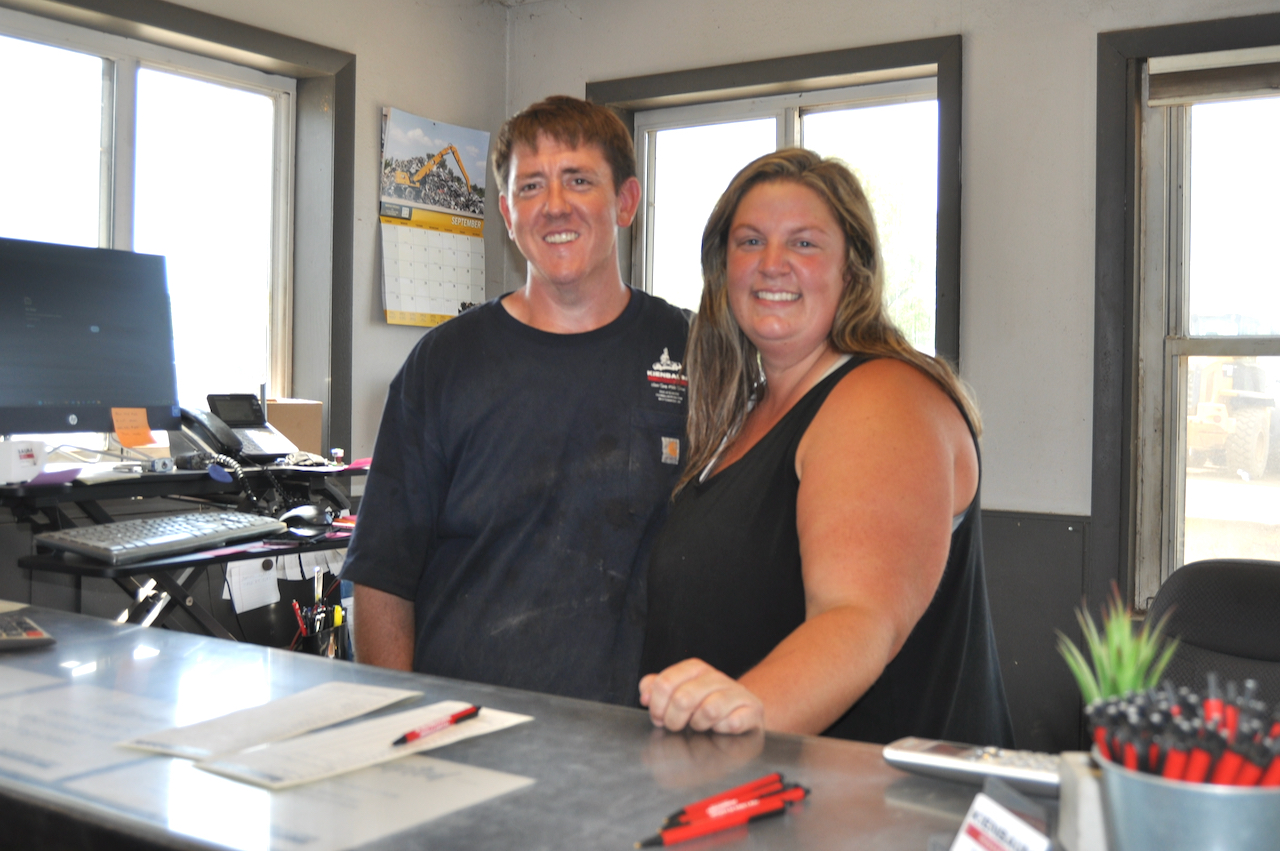
Next generation owners continue family business offering dollars for scrap
By Kim McDarison
Nolan Ells and his father, John, represent two generations of the extended Kienbaum family which has been in the scrap business in and around Whitewater for some 60 years. Nolan’s grandfather, Carl Kienbaum, Sr., who died in September of 2020, purchased a portable car crusher in 1967, and opened a business purchasing junk cars on North Jefferson Street in Whitewater, installing a scale on the property in 1974. Nine months ago, Nolan and his wife, Emily, both of Fort Atkinson, reorganized the company as Kienbaum Iron and Metal, LLC. The couple, with both members in their 30s, hopes to educate the public about the benefits of recycling. Their business model is founded on strong customer service, they recently said, which includes helping residents regionally realize the value of recycling by turning unwanted “junk” into dollars.
It’s a business built on items they buy as well as materials they sell, Nolan said.
Last Friday, the small office on the seven-acre Jefferson Street scrapyard property was receiving a steady flow of visitors.
Brad Gallagher, a resident of the town of Whitewater, arrived to do business.
He said he comes often to the yard, bringing items from home, where, he added, scrap has been piling up “for a long time.”
Another customer arrived alongside of the small office building, placing his vehicle on the 40-foot scale. Opening a back hatch, he eagerly displayed for Emily his cache of steel items, including silverware and nails.
Out in the yard, with two large cranes standing sentry, materials of all shapes and sizes glistening in the sun.
Providing an overview, Emily said vehicles come onto the property and large items are placed on the scale. Smaller items are removed from vehicles and weighed before they are sorted.
Some items, such as electric motors and tire rims, find their way into concrete bays where they wait for transport to facilities with shredders and foundries.
The yard is an amalgamation or metal and machinery, piled and sorted into a colorful mass of organized chaos.
Across the street from the yard is a second, company-owned, two- to three-acre parcel where the company stores items such as “roll-off” containers and employees repair equipment.
Containers are offered to customers with a lot of scrap, Emily said. The company will bring them to a site, free of charge, and collect them when they are full.
“We do a lot of farm clean-outs. We drop ‘em off, and they fill it,” she noted, adding that the filled containers are then weighed and a purchase price for the scrap is negotiated.
Sharing some Kienbaum family history, Emily said that Carl, Sr., had nine children, adding that today, seven of the children are still alive.
She described her mother-in-law, Cherie, as the third oldest child in the family. She married John Ells, who has worked in the yard since the 1980s,” she said.
“He still works here,” she said, adding that he recently turned 70.
Emily and Nolan were married in 2015.
“We were college sweethearts,” she said, adding that they did know each other earlier, when they both attended School District of Fort Atkinson schools, both graduating from the district’s high school in 2009, and they attended the Fort Atkinson High School junior prom together, but they didn’t become a serious couple until they both attended the University of Wisconsin-Whitewater, where they found each other again.
Emily graduated from UW-Whitewater in 2013, and Nolan, in 2014, she with a business degree specializing in human resources management, and he, with a business degree specializing in accounting and finance. Nolan also is a certified public accountant, Emily said.
After graduation, Nolan worked for a public accounting firm in Madison for about eight years, and then he worked as a controller for a Waunakee-based company that sold agricultural equipment.
When Carl, Sr., died, his estate ran the scrapyard for a few years, Emily said, noting of the estate’s holdings: “this was the last piece to get sold.”
The couple purchased the property from the estate, closing the deal in 2023 right around Christmas, she said.
Working within the scrap industry involves myriad certificates and permits, many of which require the submittal of applications on an annual or biannual basis, Emily said.
Additionally, she said, the city of Whitewater required the couple to obtain a junk dealer’s license, so, she said, “we needed to transfer the junk dealer’s license from Carl to us.”
Those transitional arrangements were undertaken in the latter part of 2023.
While a new generation operates the business, and some of its structuring has changed, it has kept the same name, Kienbaum Iron and Metal, for 60 years.
Looking back at the journey that brought her into the scrap business, Emily said: “I don’t think I grasped the industry until I was married a few years.”
Describing her husband’s journey, she said: “He worked here from when he was 12 or 13 years old.”
Growing up with the yard as a family business, she said, he developed a passion for it, so when an opportunity to run the place became available, she said, “we knew we wanted to go into the industry.”
Said Emily: “If you would have asked me at 19, when Nolan and I started dating, I would not have seen this. It would not have been foreshadowed.”
When the estate offered to sell, the couple made some changes.
Nolan changed jobs, Emily said, devoting his time to the yard.
Dawn Kienbaum, another one of Carl’s children, was running the day-to-day operations at the time, Emily said, and her father-in-law was working in the yard.
Other members of the family make their living in scrap, she said, noting that some of Nolan’s uncles operate yards in different parts of the state.
Today, the yard in Whitewater is husband-and-wife owned, and father-and-son operated, she said.
Emily, too, plays an active role. She greets customers and directs them to the appropriate spots in the yard to distribute their wares, and, she said, she does most of the office work, which she described as “a lot of paperwork,” especially when it comes to purchasing vehicles.
Also, she said, there is environmental reporting to governmental agencies.
Nolan does the accounting work and helps load materials when they leave the yard for transport to larger facilities, ones with foundries, Emily said, where metals are melted down and made ready to reemerge into the marketplace as new things.
John, too, helps with that process.
At the Whitewater yard, items are received, sorted, and cut into smaller pieces to make them easier for transport.
John also is responsible for much of the mechanical work which maintains the company’s equipment. He also delivers, along with two of the company’s part-time drivers, roll-off containers to customers.
The company has 12 full- and part-time employees, Emily said.
Among items the company receives, she said, are junk cars. the company purchases the vehicles from customers.
They strive to be competitive, and price the cars based primarily on weight, the couple said.
Once the car is received in the yard, and a deal with the customer is struck, the vehicle is processes, meaning that its parts, from motors to rims, are pulled.
“We send a lot of our materials to locations with shredders. They make them ready for the foundries,” Emily stated.
Surveying the yard on Friday, Emily said time is being spent cleaning up accumulated materials and organizing items that need to be processed.
“Back in the day,” she said, describing that time as during the 70s, 80s and 90s, and even into the early 2000s, customers could arrive at the lot and “pick and pull” parts from junk cars.
They could take parts off of cars and buy them, Emily said.
Today, she said, that service has paused. The industry has changed in a way that requires more insurance, and there are some legalities associated with offering the service.
The couple is contemplating offering the service again one day in the future, Emily said, but for now, nine months in, she said, there are other tasks at hand.
Some of the items in the yard are obscure in nature: Emily pointed to a large, blue, rod-like piece of equipment, calling it “an old ram.” She added: “There is so much random stuff, and I don’t know what it is.”
An old crane and a loader shared space with the unusual scrap, both of which still run, Emily said. She believed the equipment was purchased in the 1980s.
“Equipment is so expensive to replace. We try to keep as much stuff alive as possible,” she said.
In the yard, John and an employee, Scott “Gibby” Peterson, worked to cut large items into small pieces for transport.
Gibby used a torch to cut the metal while John used a forklift to maneuver the piece into position for cutting.
Also on the property are two small scales which are used to weigh smaller items made of brass, copper, and stainless steel, among others,” Emily said.
On average, the company processes some 13,000 pounds of aluminum cans monthly, she said, noting that the summer months tend to be busier than the rest of the year.
Housed in its own shed, a machine is employed to crush the cans and blows them into a waiting trailer. When it’s full, the cans are taken to an end user who will make a new can or other new item.
Emily said an industry statistic is that an aluminum can is recycled every 30 days, meaning from the time someone consumes its contents and disposes of the can, it is reconfigured and back on the shelf with new contents in 30 days.
Back in the office, as he helped customers, Nolan said: “I feel passionate about this place.”
The industry has come a long way over the years, he said, adding that today’s scrapyard brings attention to recycling and sustainability.
“We have a throw-away society,” Nolan said.
“Sometimes customers come in with washers and driers that are only five years old.
“My parents have a 20-year-old refrigerator that is still working, but today, things don’t last as long,” Nolan said.
Emily said that she thinks, for some, there is a perception that a scrapyard serves an older generation, and farmers and industrial corporations, looking to remove old items, but many of the customers who come to Kienbaum Iron and Metal are everyday people who don’t fit that mold.
“It’s the average citizen who is getting rid of a washer or drier,” she said, adding that customers don’t need to fit a certain mold: “Anyone can do it.”
“You can make money on your old stuff and we will help you do it,” Nolan said.
Describing the process, he said, “everything here will get shredded and melted down at a foundry and made for use in the manufacturing of new items.”
Among customers visiting the yard Friday was Jeffrey Kutz, of Fort Atkinson.
He brought three catalytic converters to sell.
“For me, it’s junk; for them, it’s raw materials,” Jeffrey said.
He frequents the scrapyard once or twice a month, he said, noting that he usually brings “big loads of scrap.”
He often collects the materials from “properties I clean up,” he said.
Upon receiving the catalytic converters, Nolan checked each one for a serial number, which, he said, helps him understand which kinds of precious metals were used in the making of the item by its particular manufacturer. That helps him determine the item’s worth as a source of raw materials.
Kutz said he pulled the parts from a 2001 Ford Explorer, a job which took him about two hours. Nolan and Emily offered him a price of $120 for all three converters, which Kutz gladly accepted.
That’s how it works, Emily said. The company offers a price and the customer decides if he’d like to accept it. She said the vast majority of their customers smile as they complete the transaction, happy for the spending money they just received.
Emily said the company sees between 10 and 100 customers each day, depending on the weather.
They come from Walworth and Jefferson counties, and sometimes Rock County, too, Nolan said.
There are even some who come from Illinois, the couple noted.
Nolan said he believed the company was drawing its customers from within a 45-minute radius.
Nine months in, and looking to the future, the couple said their goal is to grow their business. More than offering new services, they said, they want to expand the volume of the services they offer.
“We want to grow our foot traffic,” Nolan said.
Emily and Nolan said they hope residents will see worth in items that can be recycled. Rather than placing such items in a bin for curbside removal, they can bring them to the scrapyard where the items can be processed into raw materials, and find a new, useful life.
“We want to keep the recycling industry front and center, because it pays,” Nolan said.
Payoffs come in the form of helping the environment, and, he said: “it gives people a few bucks; you can get rid of something, and get a few bucks for it.
“We are looking to tap into the idea that people can bring items here and not just throw them away.”
It’s a learning experience, the couple said.
Through their investment of competitive pricing and exemplary customer service, they said, they believe people will realize the value of investing some time and effort to declutter their lives, help the environment, and gain some spending money.
To learn more about Kienbaum Iron and Metal, and find a list of the items they purchase and recycle, visit the company’s website: https://www.kienbaumiron.com/.
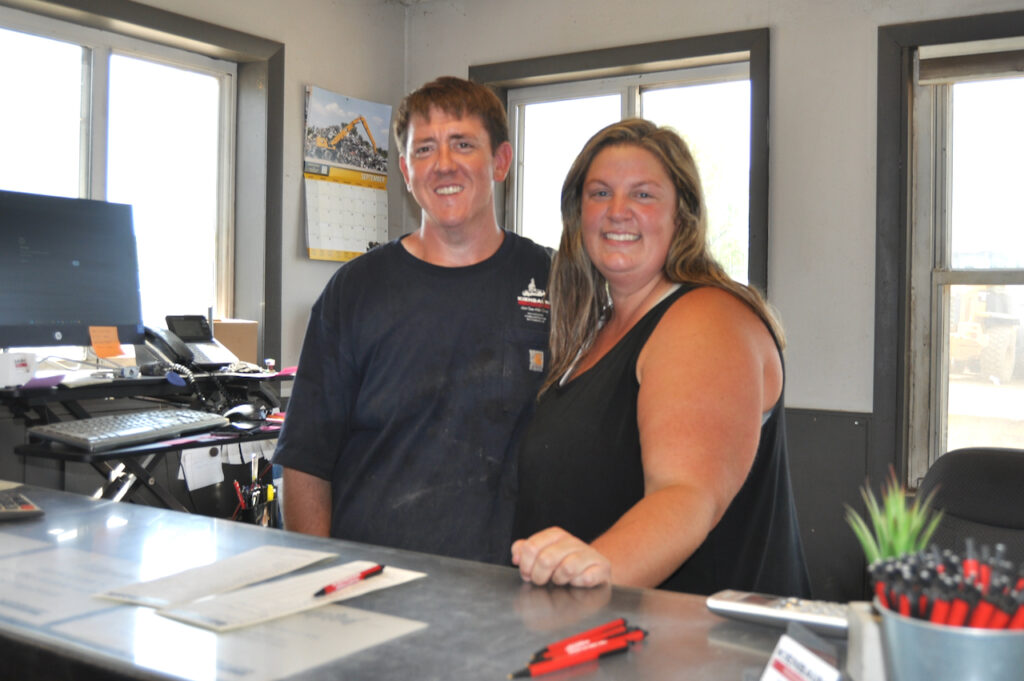
Nolan and Emily Ells greet customers from behind the counter within a small office building situated on their seven-acre scrapyard. The yard is found on Jefferson Street in Whitewater.
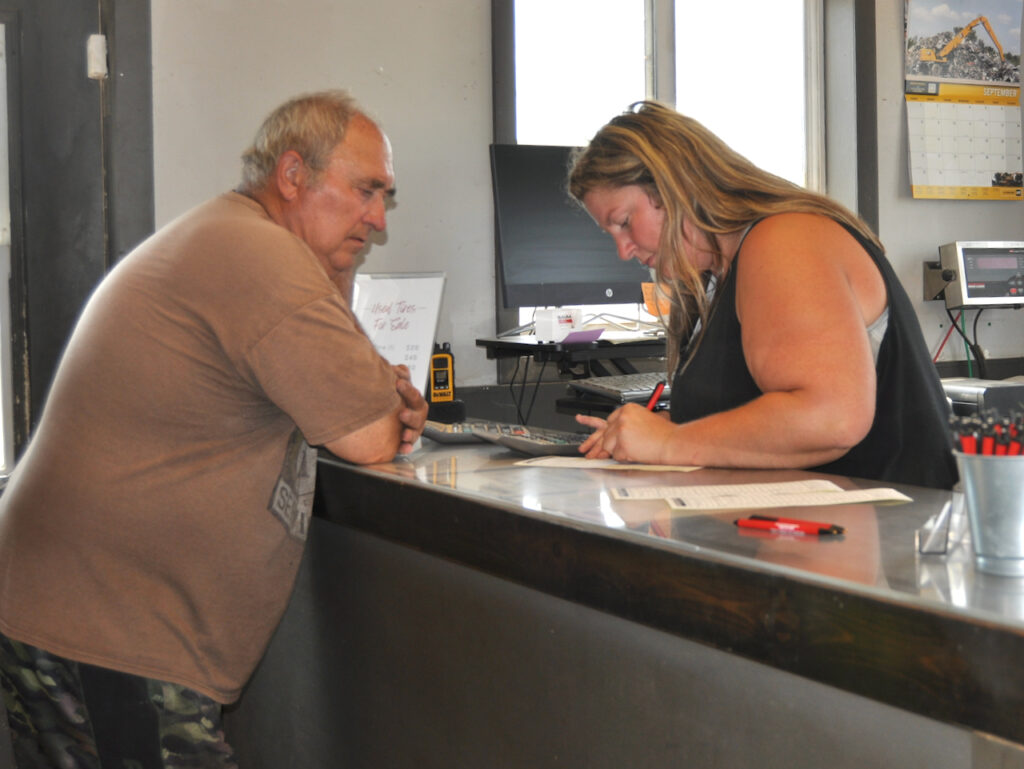
Brad Gallagher, town of Whitewater, at left, waits while Emily Ells, co-owner with her husband, Nolan, not pictured, of Kienbaum Iron and Metal, LLC, completes his paperwork. Gallagher, who brought items to sell to the company on Friday, said he often brings items from his home to the company for recycling.
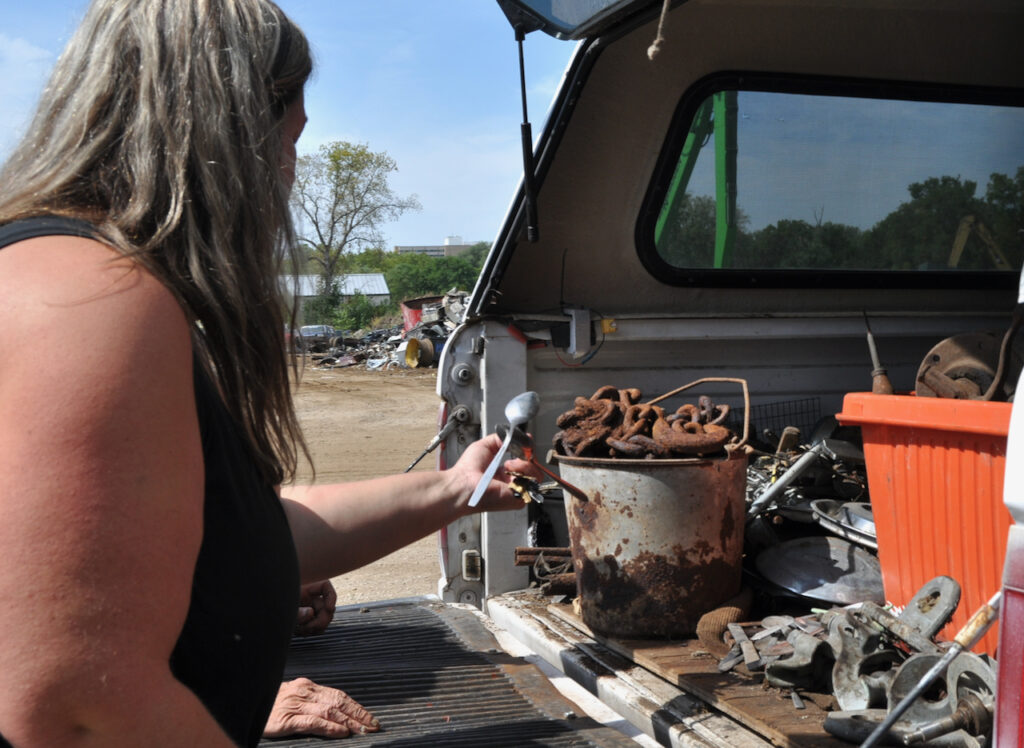
Emily Ells, co-owner of Kienbaum Iron and Metals, inspects items brought by a customer for the company to purchase and recycle.
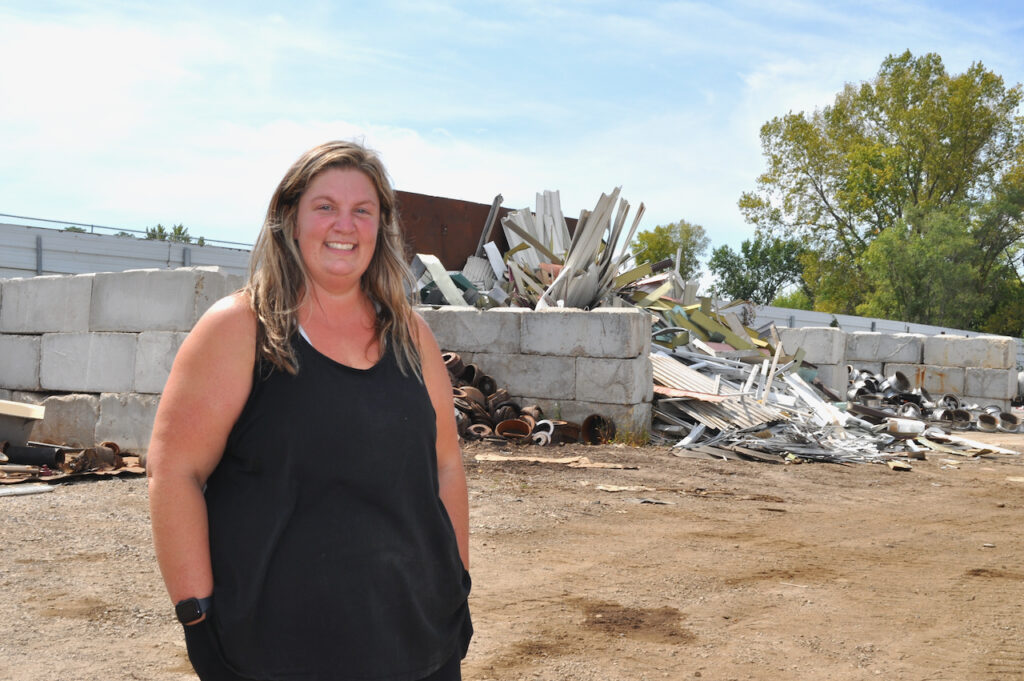
Emily Ells offers a glimpse into the scrap business. Offering a tour of the scrapyard, she stops near a series of concrete bays to explain the sorting process.
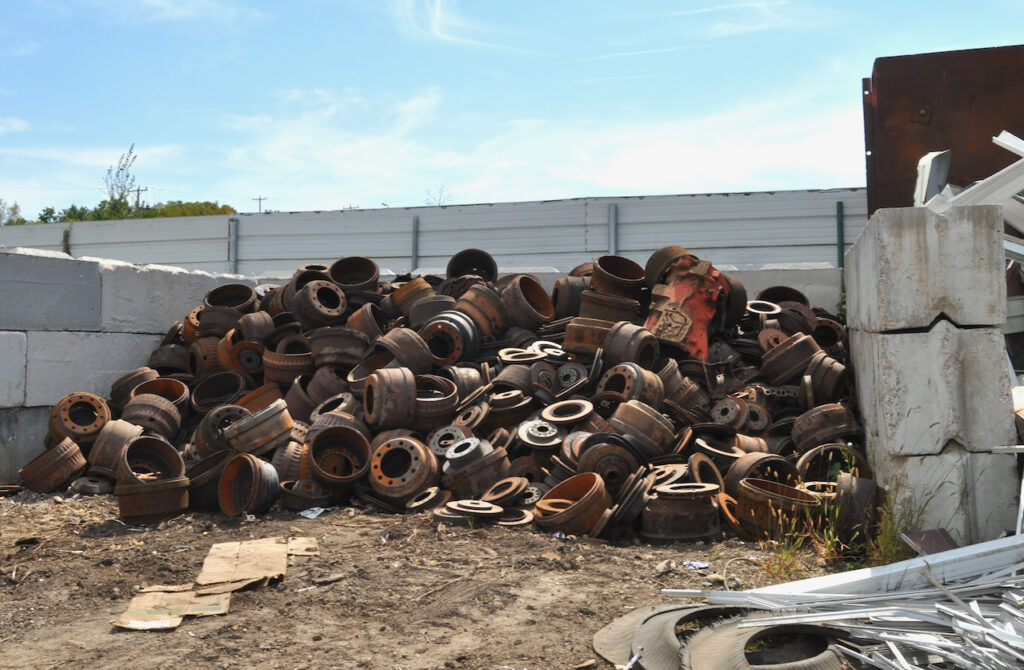
A pile of rims occupy a bay after sorting.
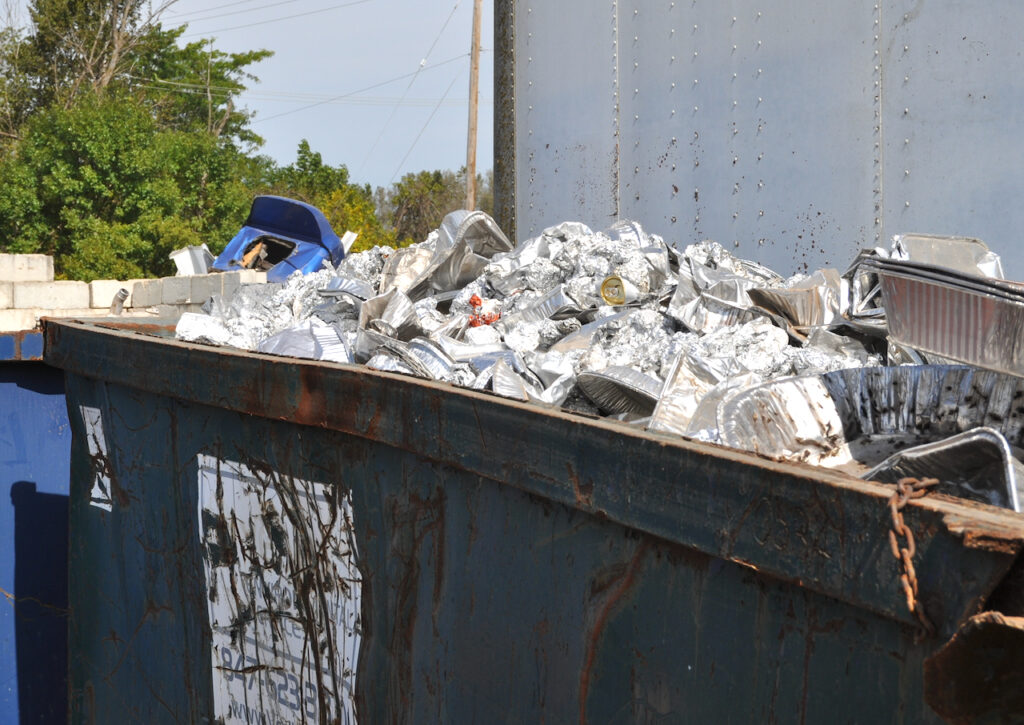
A bin, filled with all things made of tinfoil, glistens in the sun.
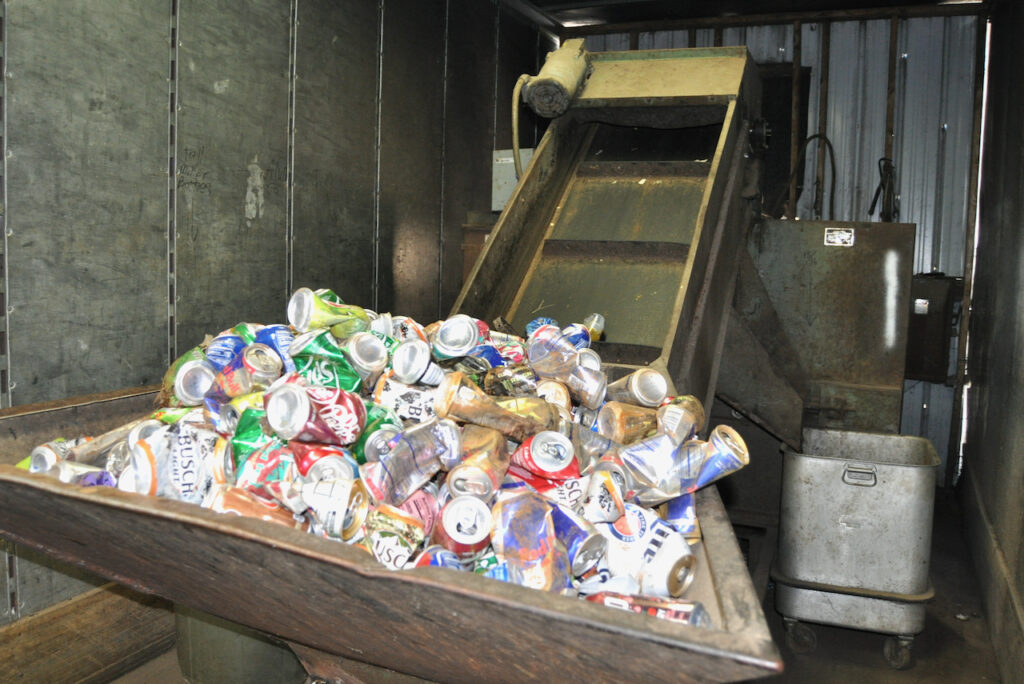
A machine stands ready to continue the process of crushing and loading cans into a waiting trailer. On average, the company processes some 13,000 pounds of aluminum cans monthly.
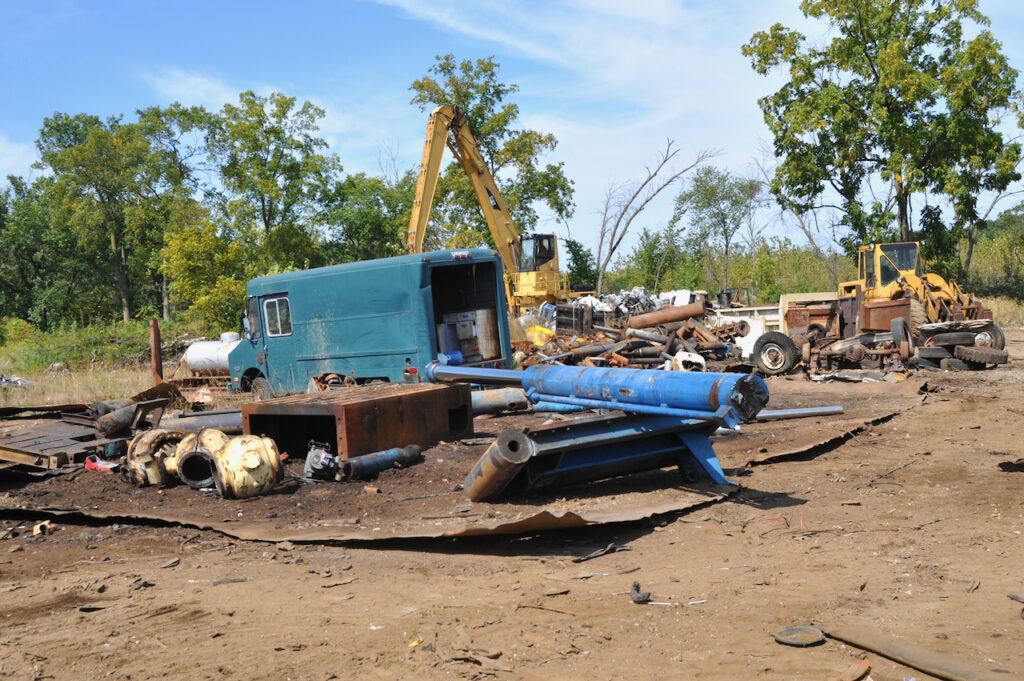
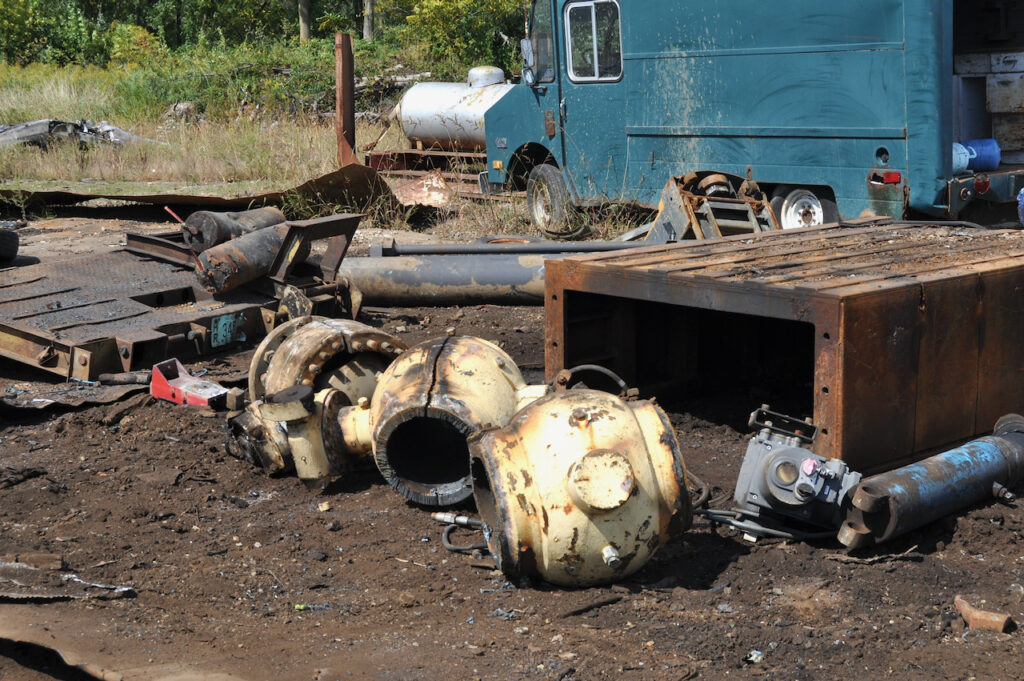
Two photos above: unusual items, some of which facility co-owner Emily Ells admits are foreign even to her, are found among the materials in the scrapyard waiting to be sorted, cut and transported to a foundry.
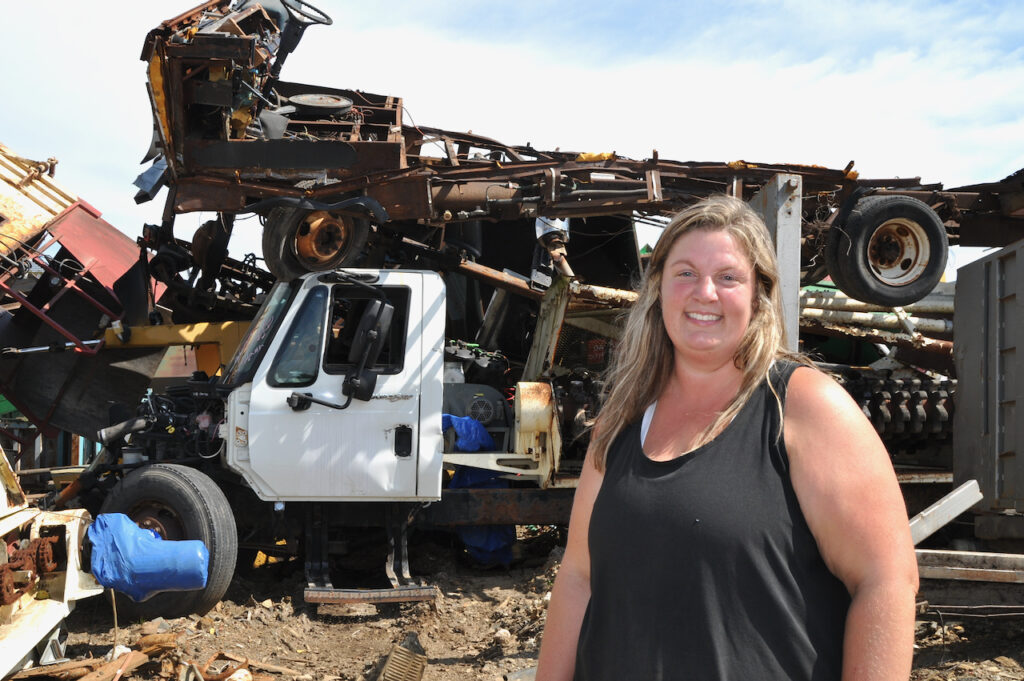
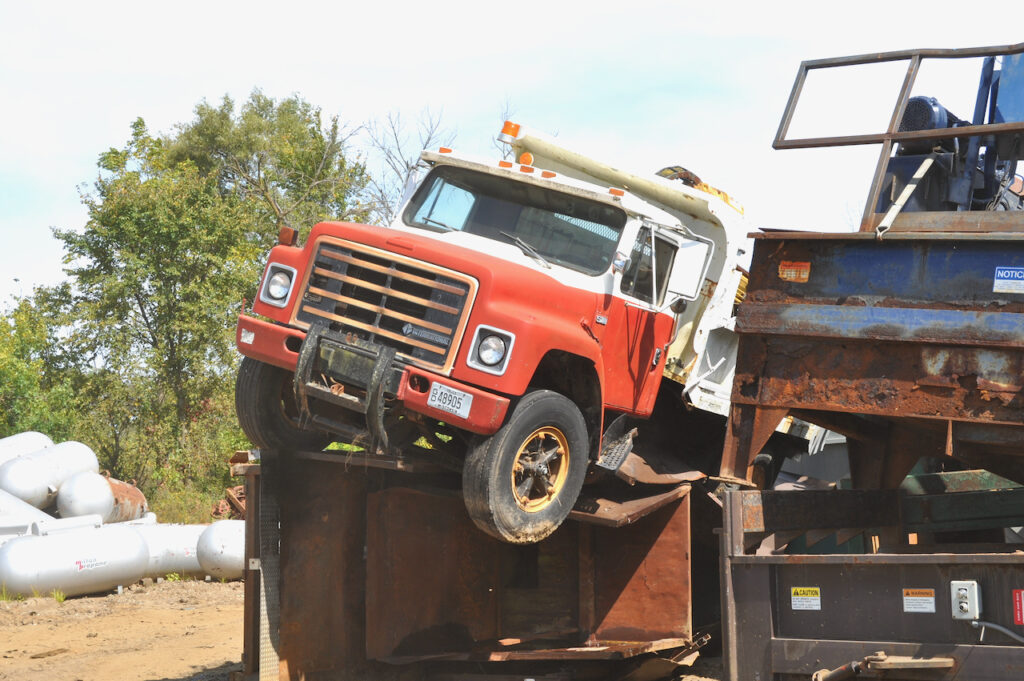
Two photos above: Emily Ells, co-owner of Kienbaum Iron and Metals, LLC, at top, shares information about the types of materials that can be recycled by the company. Large items are cut into smaller pieces before they are transported to a larger facility with a shredder and foundry.
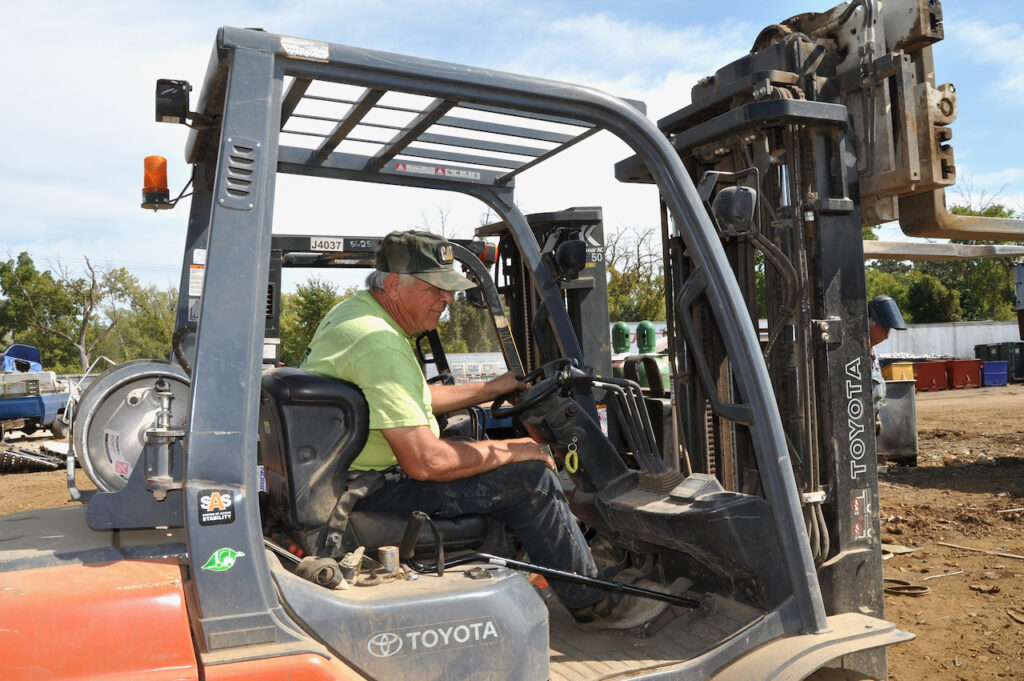
John Ells, an employee with the company since the 1980s, and father of Nolan Ells, not pictured, who is a new co-owner of the company, moves a large piece of metal into position to be cut apart.
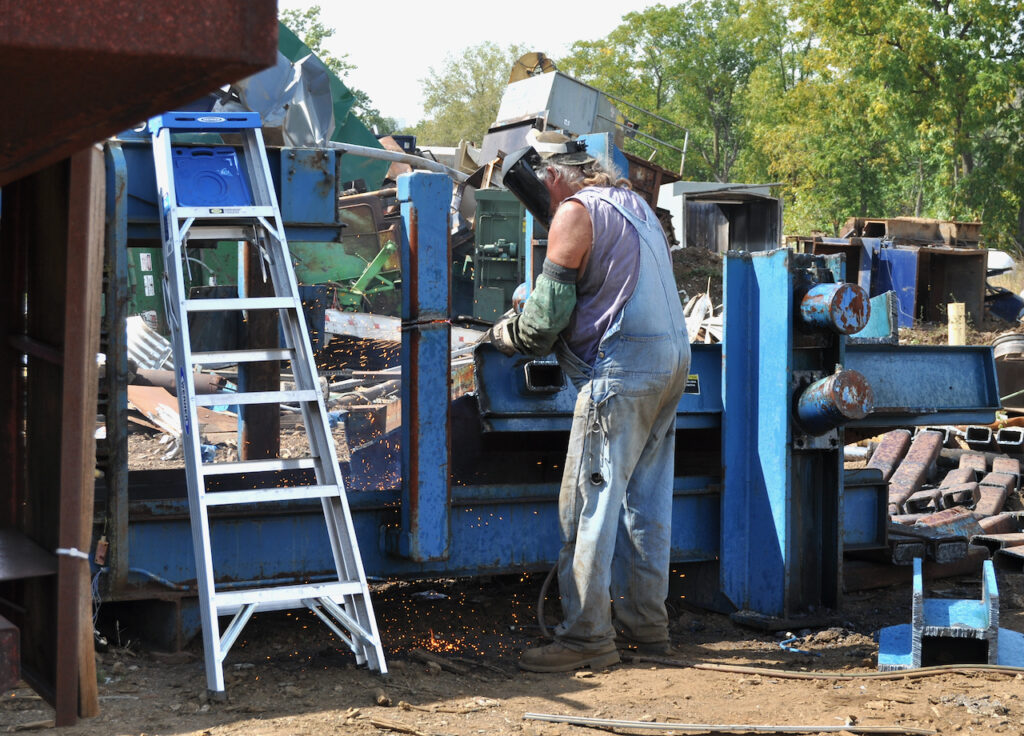
Company employee Scott “Gibby” Peterson cuts a large piece of metal into smaller chunks. The process is required to make the items ready for transport to a facility with a shredder and foundry.
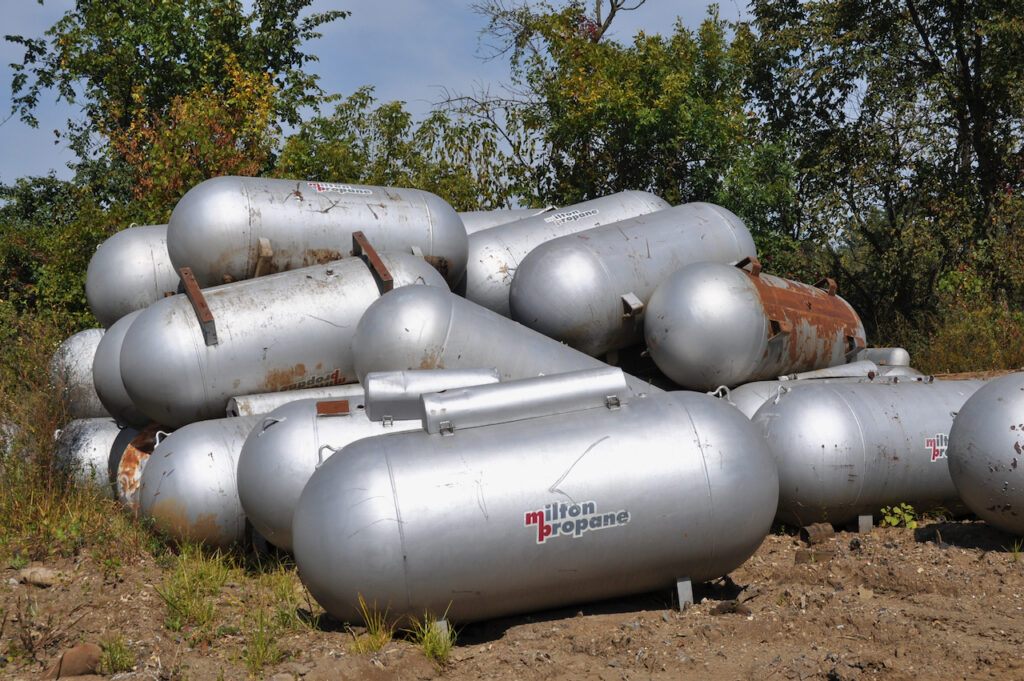
Tanks are among sorted items found in the yard.
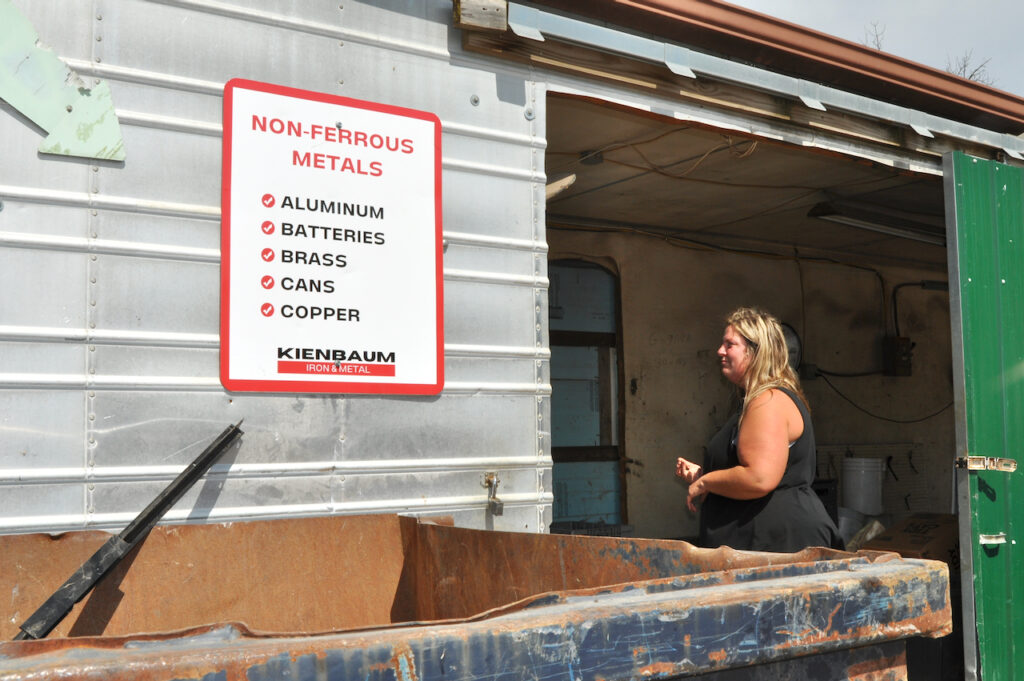
Emily Ells enters a container used to sort non-ferrous metals such as aluminum, brass and copper.
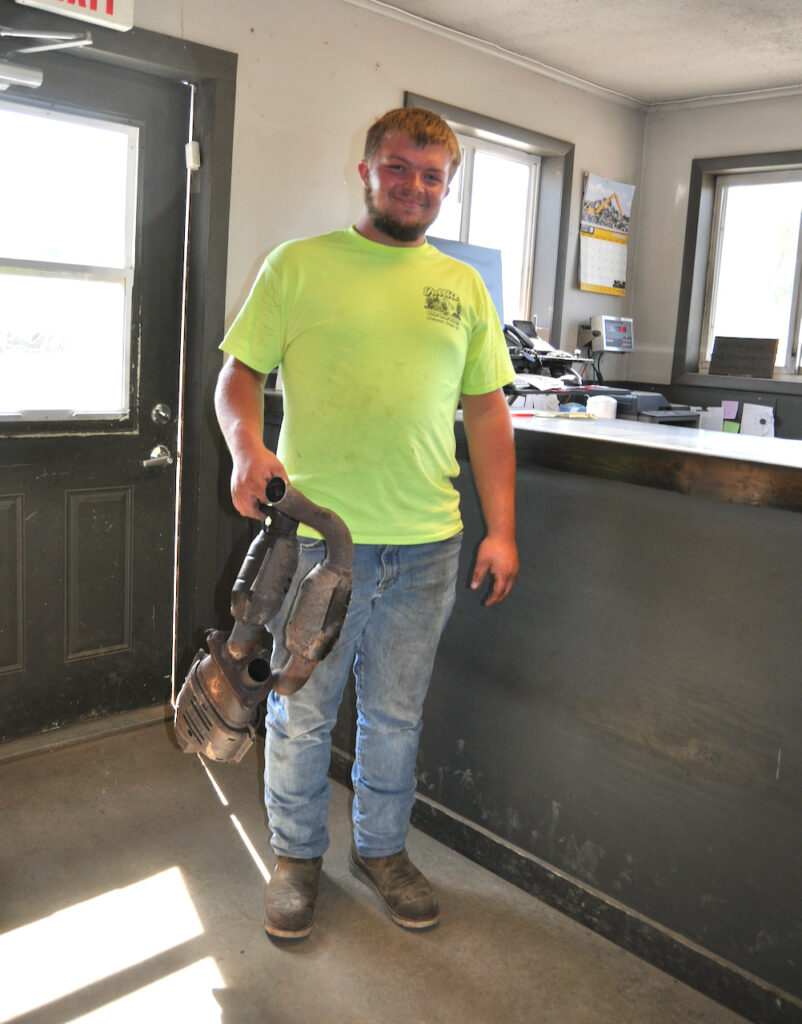
Jeffrey Kutz, Fort Atkinson, displays a catalytic converter which he removed from a vehicle. The item was one of three he brought to the scrapyard to sell to its owners.
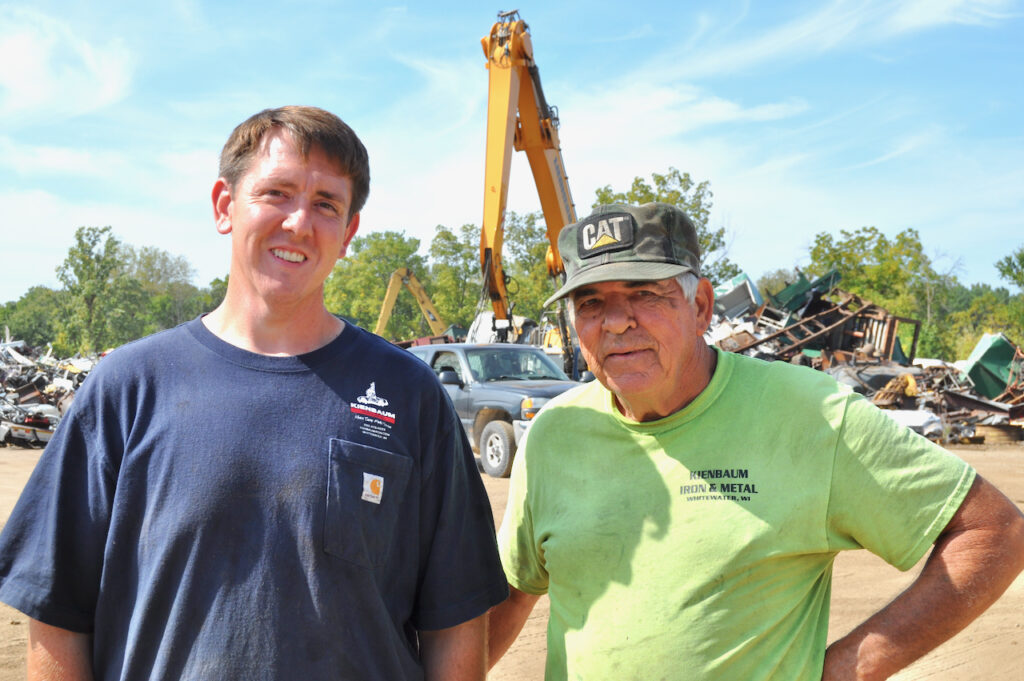
Nolan Ells, at left, and his father, John, represent two generations of the extended Kienbaum family which has been in the scrap business in and around Whitewater for some 60 years. The late Carl Kienbaum, Sr., who died in September of 2020, was Nolan’s grandfather. He purchased a portable car crusher in 1967, and opened a business purchasing junk cars on North Jefferson Street in Whitewater, installing a scale on the property in 1974. Today, Nolan, and his wife, Emily, not pictured, own the company.
Kim McDarison photos.
This post has already been read 4022 times!
Kim
Our Advertisers
Most Read Posts
Categories
- Advertisers
- Area events
- Art, culture
- Business
- Community
- County
- Crime, court
- Culture
- Diseases
- Economics
- Food
- Government
- International
- Law and Court
- Lifestyle
- Obituaries
- Opinion
- Police, fire, EMS
- Religion
- School
- Science
- Technology
- Today's features
- Today's news
- Top Stories
- Travel
- Uncategorized
- University
- World












